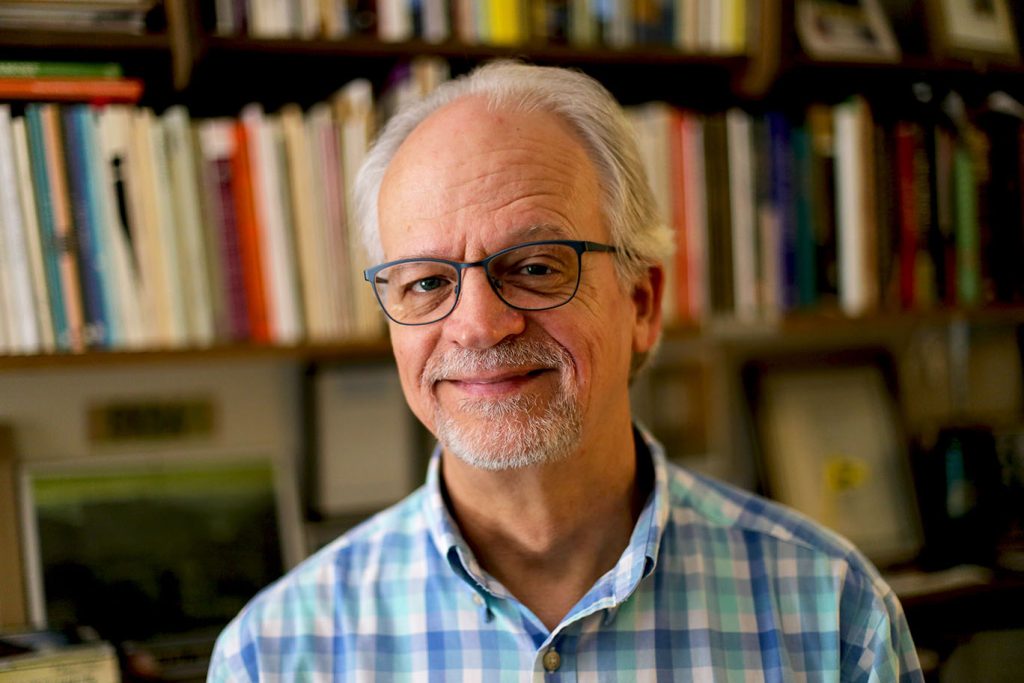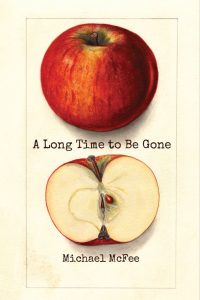
Bookmark This is a feature that highlights new books by College of Arts and Sciences faculty and alumni, published the first week of each month. This month’s featured book is A Long Time to Be Gone (Carnegie Mellon University Press) by Michael McFee.
Editor’s note: Enjoy the poem “Wee” from the book at the end of this Q&A.
 Q: Can you give us a brief synopsis of your book?
Q: Can you give us a brief synopsis of your book?
A: This book explores challenging subjects — among them the realities of aging, the early days of the COVID-19 pandemic and the disappearance of Appalachian culture — in engaging and often playful poems which, despite the shadow of mortality, discover enduring pleasures in the details of our everyday lives.
Q: How does this fit in with your research interests and passions?
A: My passion as a writer has always been to pay the closest possible attention to the world around me, to notice what may often be overlooked then preserve it in the best possible language. That’s what this book continues to do, in its lively responses to such things as a dog drinking from a puddle, an extinct heirloom apple called McAfee’s Nonsuch, a song by Duke Ellington written in Durham, and intriguing words like “coronavirus” or “teeninecy” or “wee.”
 Q: What was the original idea that made you think: “There’s a book here?”
Q: What was the original idea that made you think: “There’s a book here?”
A: Every four or five years, I look back over what I’ve written and ask, Is there a book here? Have I been working through some common themes or obsessions while writing these discrete poems? Could I arrange them into a coherent and satisfying collection of poetry? Thanks to a research and study assignment from the department of English and comparative literature in the spring of 2021, I had free time to reflect on my recent work and ask those questions. The answer was yes, and the result was A Long Time to Be Gone.
Q: What surprised you when researching/writing this book?
A: The most surprising thing was writing so many COVID poems, during the first months of the pandemic in spring 2020. I didn’t set out to do that — I’m not a topical poet, and I usually work quite slowly — but it became a way to deal with that weird, scary, disorienting time, and to document some of its details in short poems, almost like diary entries. The strongest of those became section two of the new book.
Q: Where’s your go-to writing spot, and how do you deal with writer’s block?
A: For over 40 years, I’ve written in the front corner room of my house in Durham. I sit down at that familiar desk in the morning and begin drafting — by hand, on paper — what might turn into a new poem or essay. With any luck, something good happens while I’m working on that word-world. As for less fruitful times: if the writing seems reluctant to come, I’ll step away from the desk for a while and do something very different to clear my head, then come back and try again.
Michael McFee is Doris Betts Term Professor in the department of English and comparative literature.
McFee has several local upcoming book readings: Saturday, Feb. 4 at 11 a.m. at McIntyre’s Books in Fearrington Village; Tuesday, March 7 at 3:30 p.m. in Greenlaw Hall’s Donovan Lounge (with novelist and English department colleague Michael Gutierrez); and Wednesday, April 5 at 6:30 p.m. at Letters Bookshop in Durham.
Nominate a book we should feature by emailing college-news@unc.edu. Find previous “Bookmark This” features by searching the term on our website, and add some books to your reading list by checking out our College magazine books page.
***
Wee
The small dark hours, yes,
from midnight to dawn—
one, two, three, four, five—
but also a bit
of space, a short way
in Scots; awake, though,
it feels so far to
the first hint of light
that means a new day,
nobody alive
but the Lord and me
during the We hours,
that deep thick time ours,
no need for either
to speak or to see.
